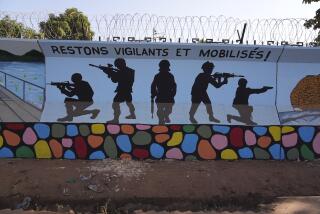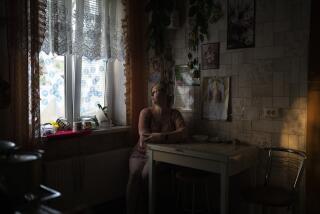Village Still Under Siege After Serb Raid in Kosovo
- Share via
LAUSA, Yugoslavia — One by one, the men and then the women and children peered from behind wooden gates Thursday and slowly emerged to speak of the days and nights spent hiding from Serbian security forces that surround this village.
“You see up there in the hills,” said Ali Geci, pointing to a tree line in the distance. “They’re up there, the paramilitaries, the snipers. We are surrounded. We cannot leave our houses. . . . Every day there is shooting.”
Geci, his two brothers, their wives and children are among scores of ethnic Albanians trapped in this town since the government launched an assault on separatists seeking independence for the province of Kosovo in Serbia.
When police opened fire on the village of Prekaze on March 5, they simultaneously sealed off Lausa. Some townspeople managed to escape; but most remained behind, unable to flee, camping at night in the fields and hiding by day in a town in effect under siege.
Few outsiders have reached Lausa. Roads are blocked by police checkpoints, and humanitarian aid workers said the area remained off limits to them. Nevertheless, officers at a checkpoint allowed journalists through Thursday.
The town at first appeared deserted. No dogs roamed the streets, no smoke wafted from chimneys. Long rows of crows stood undisturbed on fences and snowy rooftops. It was silent.
But eventually, dozens of ethnic Albanians emerged. Food had become scarce, they said, leaving them little more than bread to eat. Electricity had been cut. Ten people were killed during the past week by police snipers, they said, including one man, Mustafa Rrecaj, who was wounded and lay dying for two days because townspeople were afraid to approach him. One elderly man died this week because he did not have medicine, they said.
Geci was preparing to move his family into the mountains for safety. Inside their home behind high walls, the women packed a single bag with diapers and children’s clothes. Two toddlers, dressed in matching blue snowsuits, awaited the trip.
One of the women, Zarife Geci, held her 15-month-old daughter, Arizona, and pleaded for help.
“My baby is hungry, and I have no food. There is no more milk in my breast. She wants to eat,” she said, begging a reporter to smuggle the child out of Lausa.
In most of Kosovo, the shooting and shelling of alleged Albanian separatist strongholds appear to have subsided. But security forces remain deployed throughout the region.
In Lausa, government strategists for now apparently have chosen slow strangulation over outright attack. The motives for this were not clear, and efforts to seek explanation Thursday from Serbian authorities were unsuccessful. Serbia, along with Montenegro, makes up what’s left of Yugoslavia.
Western officials believe that authorities have judged Lausa to be full of guerrilla sympathizers and may be preparing to attack after first weakening the village.
“They [police special forces] have made it pretty clear they are not through,” said one Western official, despite statements from Serbian leaders last weekend that the “terrorist core” had been destroyed in fighting at Prekaze that killed dozens of people, including women and children.
Fifty-two people were buried in Prekaze on Wednesday.
On Thursday, as on previous days, police officers armed with assault rifles and dressed in battle gear manned checkpoints on roads near Lausa and throughout this area of Kosovo known as Drenica. They appeared more tense than the day before. Army troops, who are not officially involved in the current crackdown, were seen clambering from two trucks on a road leading to the nearby town of Mitrovica.
Lausa was the site of what had been, until last week, the largest confrontation between Serbian police and armed separatists from the Kosovo Liberation Army. Guerrillas ambushed a security patrol on the Lausa outskirts in November. The ensuing battle with guns and antitank cannons sent the police fleeing, shooting pell-mell into the village. The gunfire killed a teacher, Haljit Geci.
That killing, which came on top of years of abuse that Albanians say they have suffered at Serbian hands, was the last straw for many in Lausa. In December, many told The Times that they were prepared to take up arms against Serbian authorities.
On Thursday, several men in Lausa insisted that they were not armed. Up the street from Ali Geci’s home, about 50 men gathered in the communal room of another house said their fight to defend Lausa would be through iron will rather than military hardware.
Idriz Rrecaj, one town leader, said he and others remained dedicated to a peaceful solution, and he called on the West to help.
But outside the communal room, where residents had hung a yellow tarp as a screen after a sniper’s bullet pierced their satellite dish, the frustration assumed a harder edge.
“It is better to die than to starve,” said one man.
There was no progress Thursday in the search for a political resolution to Kosovo’s troubles. A delegation dispatched to Pristina, the Kosovo capital, by Yugoslav President Slobodan Milosevic arrived with an offer of dialogue. But Albanian leaders boycotted the meeting, insisting that any discussion must be without conditions and with international mediation.
Albanian leaders are demanding independence, but Serbian officials say they will only consider restoring the regional autonomy that Milosevic revoked in 1989.
The Albanians said the dialogue offer is insincere and comes only because of intense international condemnation of Serbian brutality. The Serbian delegates said they would be available to talk today.
In Washington, administration officials also rejected the Serbs’ latest offer as propaganda.
“It seems like the Belgrade authorities are proposing things that are bound to fail,” said State Department spokesman James P. Rubin. “The announcement of a supposed Serb offer to negotiate consisted in large part of a justification for the use of force in Kosovo and contained no hint of remorse for the deaths of innocent Albanian victims. It’s time for the propaganda to stop and the negotiations to start.”
Rubin urged both sides to “put aside their maximum demands and agree to sit down and talk without any preconditions.”
The comments came as Deputy Secretary of State Strobe Talbott departed for a trip to the region that will take him to Slovenia, Albania, Macedonia, Bulgaria and Romania to drum up support for a tough stand against Milosevic’s policies toward Kosovo.
Times staff writer Tyler Marshall in Washington contributed to this report.
More to Read
Sign up for Essential California
The most important California stories and recommendations in your inbox every morning.
You may occasionally receive promotional content from the Los Angeles Times.














